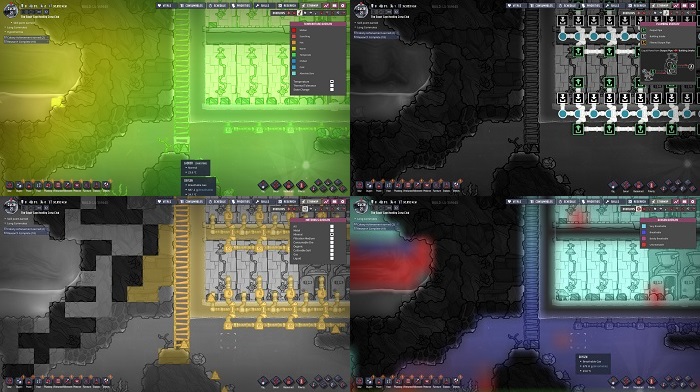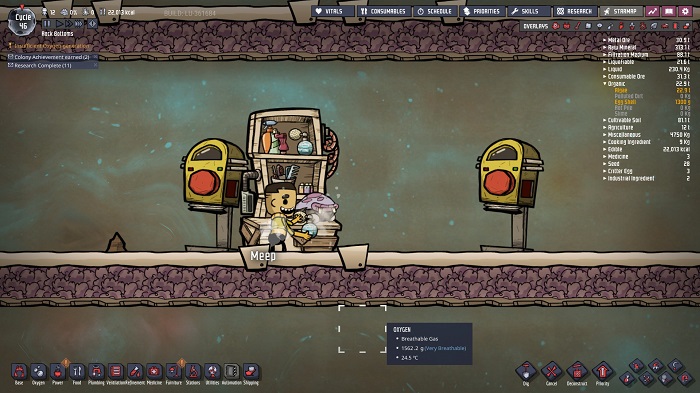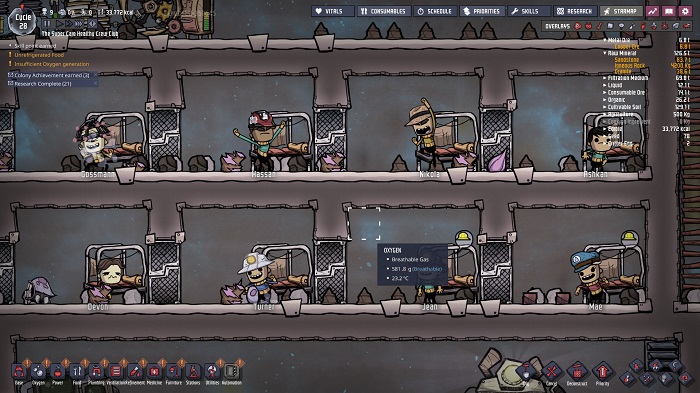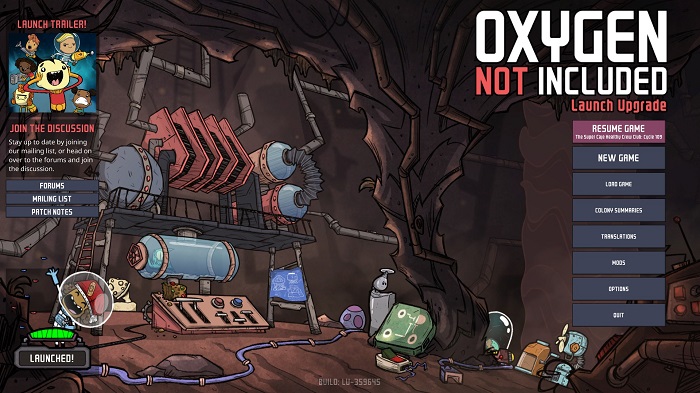Subjective:
Developer and publisher Klei Entertainment hope to take the colony survival genre into an engaging direction with Oxygen Not Included (abbreviated as ONI from this point on). With ONI‘s point and click interface, Klei adds reams of information about environment, temperature, liquid exchange, and a host of other details in the hopes the player will learn about how each system works with the next. Through careful management of the colony, the player might guide the duplicants of ONI into the stars or an early grave.
Objective:
Get ready to macro and micro manage as the duplicants of ONI are only able to carry out orders as the player delivers them. Starting with building the basics for survival, including oxygen generation (Klei Entertainment isn’t lying with “oxygen not included”) and food preparation, the player can introduce a wealth of more complicated systems to ensure their colony’s survival. There is an end goal of sorts in navigating the stars while celebrating the duplicants’ roots with monuments, but how the player gets there can almost be as simple or complicated as they like. I write almost because if the player wants the monument or star navigation end goals to be reached, they must engage with the more complicated material generation systems. However, players can just as easily focus on making an aesthetically pleasing, self-sustainable base.

Assessment:
ONI has wormed itself into my daily thought process in a big way. My air conditioning, which hasn’t worked until recently, wasn’t making my bedroom much cooler but my living room was tolerable. So, after a lengthy (and they’ve all been lengthy) round of ONI, my imagination started separating my rooms into different degrees of heat like one of the information overlays within ONI. Realizing that the vent in my bedroom wasn’t enough (vent management being a thing in ONI), I set up two air movers and – voila – my bedroom finally started to cool off and I was less miserable.
I’m somewhat astonished at how thoroughly ONI has wormed itself into my thought process. Klei Entertainment’s previous foray into survival gameplay, the thoroughly unpleasant and thudding experience that is Don’t Starve, didn’t lead me to think that ONI would be nearly this engaging. But ONI‘s trick for success is one more developers would be keen to study. ONI removes the control Don’t Starve granted, leading the player to order actions that the duplicants will do their best to carry out.
This turns the onus of responsibility on carrying out each task of survival from individual actions to a more holistic understanding of the environment. When something goes wrong in ONI, it’s not because my duplicants failed to do what I told them to do. On the contrary, they sometimes did what I told them to do so well that they dug themselves into a grave, sealed themselves off, or worked so thoroughly into exhaustion that they forgot to eat or go to sleep in their beds. This takes ONI out of many of the frustrating aspects of direct responsibility that often made Don’t Starve play as an overwhelming chore and instead pit me against my own understanding of what the systems are going to do.

This is design that owes a lot more to the classic puzzler Lemmings than it does Klei’s own Don’t Starve or other recent survival games. Problems are of your own creation, and you must be the god that doles out tasks that may not be carried out as well as you like to dig yourself out. ONI‘s overall aesthetic reflects this wonderfully, giving each of the characters a cheer and focus in their work that will diminish if their needs are not met. It’s in the individual needs of the duplicants that Klei also shows an understanding of what keeps people going from day to day. Food, oxygen, and shelter are obvious musts. But if duplicants don’t have a place to blow off steam or are kept away from each other so that they can’t socialize, then they’ll quickly get stressed and may start taking it out on the environment. Loneliness is a strange thing to manage in games and the fact that it’s something that has to be addressed at all puts this in a far more “realistic” frame than the brutal difficulty of Don’t Starve.
Those little touches keep doubling back on themselves to show how intricately layered the systems in ONI are. Leave a little bit of water on the ground and the duplicants will get upset that they have wet feet while stopping to shake it off. Send someone to mop it and they’ll move faster while also sharing a bit of morale boosting appreciation. Start pumping oxygen with a special electrolyzer and you’ll create breathable spaces alongside unbreathable hydrogen zones. So then you can start tracking how these environments are sustaining themselves along with the mental health effect they’re having on the duplicants. Don’t want to bother with all of this? Fine, just leave the tech tree alone and manage with the straightforward (but inefficient) base tools you’re given.
That scaffolding of complexity is the one place ONI falters. I’ve got nearly 200 hours into it now, and when my colonies have fallen apart it’s because of one kink in one system that’s difficult to diagnose after it’s gone wrong. Despite the plethora of information and overlays on hand, if that information doesn’t lead to a clear diagnosis, then it become another bit of overwhelming noise instead of clarifying details. All the engagement in ONI still falls next to the near-shriek of anger when I realize some ten hours into a new colony that because I didn’t relieve enough pressure on one wire, the oxygen falters, which causes enough of a delay to cease food production and thus leaves some duplicants hungry until they don’t have the oomph needed to survive a mining trip.

The Review
Oxygen Not Included
ONI is one of the only great games I've played this year. Klei's masterful work creating individual, dense, and informative systems that build on one another while also communicating via the lighthearted animation is a tremendous task to have accomplished. That they did so with few hiccups and have gotten me to look at the world as they frame it, albeit temporarily, is an incredible feat.
PROS
- Phenomonally engaging series of systems that affect colony development that, for the most part, are intuitive and engaging to utilize.
- Art and animation draw the player into the duplicants individual personalities while giving hints about what may be wrong.
CONS
- Systems are, at times, too dense to the point where it's unintuitive to diagnose what went wrong until well after the colony has gone to hell.



